Cheng-Ping Hsieh
NVIDIA Nemotron 3: Efficient and Open Intelligence
Dec 24, 2025Abstract:We introduce the Nemotron 3 family of models - Nano, Super, and Ultra. These models deliver strong agentic, reasoning, and conversational capabilities. The Nemotron 3 family uses a Mixture-of-Experts hybrid Mamba-Transformer architecture to provide best-in-class throughput and context lengths of up to 1M tokens. Super and Ultra models are trained with NVFP4 and incorporate LatentMoE, a novel approach that improves model quality. The two larger models also include MTP layers for faster text generation. All Nemotron 3 models are post-trained using multi-environment reinforcement learning enabling reasoning, multi-step tool use, and support granular reasoning budget control. Nano, the smallest model, outperforms comparable models in accuracy while remaining extremely cost-efficient for inference. Super is optimized for collaborative agents and high-volume workloads such as IT ticket automation. Ultra, the largest model, provides state-of-the-art accuracy and reasoning performance. Nano is released together with its technical report and this white paper, while Super and Ultra will follow in the coming months. We will openly release the model weights, pre- and post-training software, recipes, and all data for which we hold redistribution rights.
Nemotron 3 Nano: Open, Efficient Mixture-of-Experts Hybrid Mamba-Transformer Model for Agentic Reasoning
Dec 23, 2025Abstract:We present Nemotron 3 Nano 30B-A3B, a Mixture-of-Experts hybrid Mamba-Transformer language model. Nemotron 3 Nano was pretrained on 25 trillion text tokens, including more than 3 trillion new unique tokens over Nemotron 2, followed by supervised fine tuning and large-scale RL on diverse environments. Nemotron 3 Nano achieves better accuracy than our previous generation Nemotron 2 Nano while activating less than half of the parameters per forward pass. It achieves up to 3.3x higher inference throughput than similarly-sized open models like GPT-OSS-20B and Qwen3-30B-A3B-Thinking-2507, while also being more accurate on popular benchmarks. Nemotron 3 Nano demonstrates enhanced agentic, reasoning, and chat abilities and supports context lengths up to 1M tokens. We release both our pretrained Nemotron 3 Nano 30B-A3B Base and post-trained Nemotron 3 Nano 30B-A3B checkpoints on Hugging Face.
SWAN-GPT: An Efficient and Scalable Approach for Long-Context Language Modeling
Apr 11, 2025Abstract:We present a decoder-only Transformer architecture that robustly generalizes to sequence lengths substantially longer than those seen during training. Our model, SWAN-GPT, interleaves layers without positional encodings (NoPE) and sliding-window attention layers equipped with rotary positional encodings (SWA-RoPE). Experiments demonstrate strong performance on sequence lengths significantly longer than the training length without the need for additional long-context training. This robust length extrapolation is achieved through our novel architecture, enhanced by a straightforward dynamic scaling of attention scores during inference. In addition, SWAN-GPT is more computationally efficient than standard GPT architectures, resulting in cheaper training and higher throughput. Further, we demonstrate that existing pre-trained decoder-only models can be efficiently converted to the SWAN architecture with minimal continued training, enabling longer contexts. Overall, our work presents an effective approach for scaling language models to longer contexts in a robust and efficient manner.
L0-Reasoning Bench: Evaluating Procedural Correctness in Language Models via Simple Program Execution
Mar 28, 2025Abstract:Complex reasoning tasks often rely on the ability to consistently and accurately apply simple rules across incremental steps, a foundational capability which we term "level-0" reasoning. To systematically evaluate this capability, we introduce L0-Bench, a language model benchmark for testing procedural correctness -- the ability to generate correct reasoning processes, complementing existing benchmarks that primarily focus on outcome correctness. Given synthetic Python functions with simple operations, L0-Bench grades models on their ability to generate step-by-step, error-free execution traces. The synthetic nature of L0-Bench enables systematic and scalable generation of test programs along various axes (e.g., number of trace steps). We evaluate a diverse array of recent closed-source and open-weight models on a baseline test set. All models exhibit degradation as the number of target trace steps increases, while larger models and reasoning-enhanced models better maintain correctness over multiple steps. Additionally, we use L0-Bench to explore test-time scaling along three dimensions: input context length, number of solutions for majority voting, and inference steps. Our results suggest substantial room to improve "level-0" reasoning and potential directions to build more reliable reasoning systems.
How much do contextualized representations encode long-range context?
Oct 16, 2024



Abstract:We analyze contextual representations in neural autoregressive language models, emphasizing long-range contexts that span several thousand tokens. Our methodology employs a perturbation setup and the metric \emph{Anisotropy-Calibrated Cosine Similarity}, to capture the degree of contextualization of long-range patterns from the perspective of representation geometry. We begin the analysis with a case study on standard decoder-only Transformers, demonstrating that similar perplexity can exhibit markedly different downstream task performance, which can be explained by the difference in contextualization of long-range content. Next, we extend the analysis to other models, covering recent novel architectural designs and various training configurations. The representation-level results illustrate a reduced capacity for high-complexity (i.e., less compressible) sequences across architectures, and that fully recurrent models rely heavily on local context, whereas hybrid models more effectively encode the entire sequence structure. Finally, preliminary analysis of model size and training configurations on the encoding of long-range context suggest potential directions for improving existing language models.
nGPT: Normalized Transformer with Representation Learning on the Hypersphere
Oct 01, 2024



Abstract:We propose a novel neural network architecture, the normalized Transformer (nGPT) with representation learning on the hypersphere. In nGPT, all vectors forming the embeddings, MLP, attention matrices and hidden states are unit norm normalized. The input stream of tokens travels on the surface of a hypersphere, with each layer contributing a displacement towards the target output predictions. These displacements are defined by the MLP and attention blocks, whose vector components also reside on the same hypersphere. Experiments show that nGPT learns much faster, reducing the number of training steps required to achieve the same accuracy by a factor of 4 to 20, depending on the sequence length.
RULER: What's the Real Context Size of Your Long-Context Language Models?
Apr 11, 2024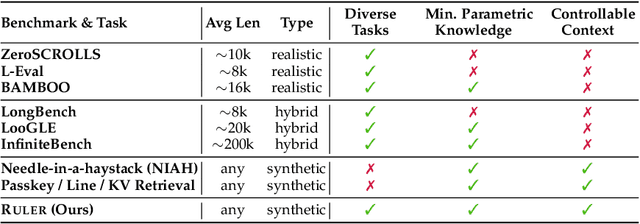

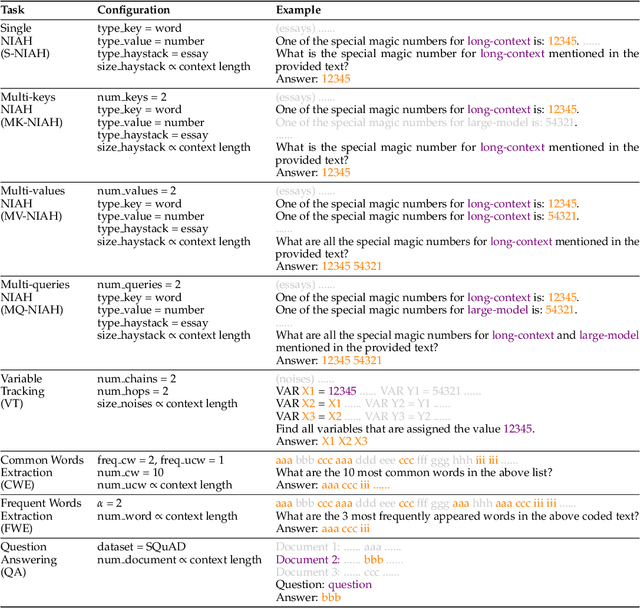

Abstract:The needle-in-a-haystack (NIAH) test, which examines the ability to retrieve a piece of information (the "needle") from long distractor texts (the "haystack"), has been widely adopted to evaluate long-context language models (LMs). However, this simple retrieval-based test is indicative of only a superficial form of long-context understanding. To provide a more comprehensive evaluation of long-context LMs, we create a new synthetic benchmark RULER with flexible configurations for customized sequence length and task complexity. RULER expands upon the vanilla NIAH test to encompass variations with diverse types and quantities of needles. Moreover, RULER introduces new task categories multi-hop tracing and aggregation to test behaviors beyond searching from context. We evaluate ten long-context LMs with 13 representative tasks in RULER. Despite achieving nearly perfect accuracy in the vanilla NIAH test, all models exhibit large performance drops as the context length increases. While these models all claim context sizes of 32K tokens or greater, only four models (GPT-4, Command-R, Yi-34B, and Mixtral) can maintain satisfactory performance at the length of 32K. Our analysis of Yi-34B, which supports context length of 200K, reveals large room for improvement as we increase input length and task complexity. We open source RULER to spur comprehensive evaluation of long-context LMs.
Universal Model in Online Customer Service
Feb 24, 2024



Abstract:Building machine learning models can be a time-consuming process that often takes several months to implement in typical business scenarios. To ensure consistent model performance and account for variations in data distribution, regular retraining is necessary. This paper introduces a solution for improving online customer service in e-commerce by presenting a universal model for predict-ing labels based on customer questions, without requiring training. Our novel approach involves using machine learning techniques to tag customer questions in transcripts and create a repository of questions and corresponding labels. When a customer requests assistance, an information retrieval model searches the repository for similar questions, and statistical analysis is used to predict the corresponding label. By eliminating the need for individual model training and maintenance, our approach reduces both the model development cycle and costs. The repository only requires periodic updating to maintain accuracy.
Adapter-Based Extension of Multi-Speaker Text-to-Speech Model for New Speakers
Nov 01, 2022



Abstract:Fine-tuning is a popular method for adapting text-to-speech (TTS) models to new speakers. However this approach has some challenges. Usually fine-tuning requires several hours of high quality speech per speaker. There is also that fine-tuning will negatively affect the quality of speech synthesis for previously learnt speakers. In this paper we propose an alternative approach for TTS adaptation based on using parameter-efficient adapter modules. In the proposed approach, a few small adapter modules are added to the original network. The original weights are frozen, and only the adapters are fine-tuned on speech for new speaker. The parameter-efficient fine-tuning approach will produce a new model with high level of parameter sharing with original model. Our experiments on LibriTTS, HiFi-TTS and VCTK datasets validate the effectiveness of adapter-based method through objective and subjective metrics.
Mr. Right: Multimodal Retrieval on Representation of ImaGe witH Text
Sep 28, 2022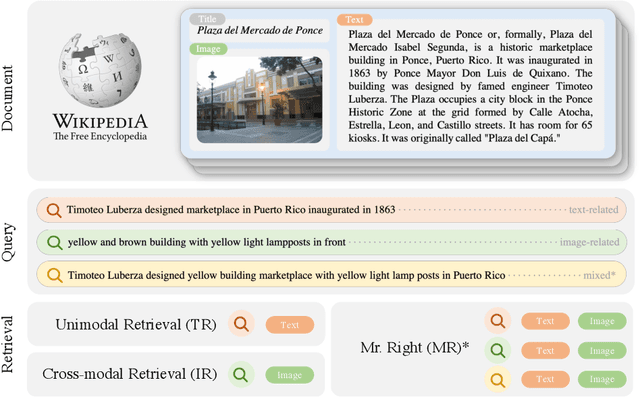
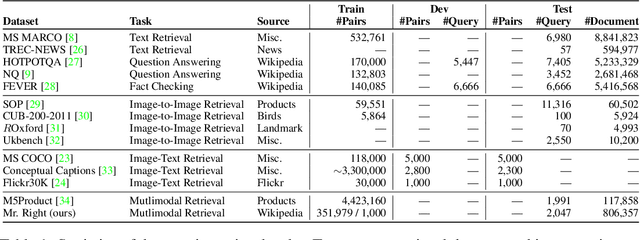
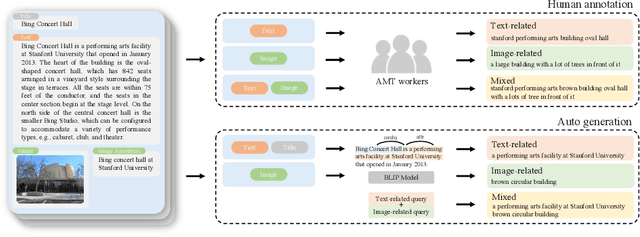

Abstract:Multimodal learning is a recent challenge that extends unimodal learning by generalizing its domain to diverse modalities, such as texts, images, or speech. This extension requires models to process and relate information from multiple modalities. In Information Retrieval, traditional retrieval tasks focus on the similarity between unimodal documents and queries, while image-text retrieval hypothesizes that most texts contain the scene context from images. This separation has ignored that real-world queries may involve text content, image captions, or both. To address this, we introduce Multimodal Retrieval on Representation of ImaGe witH Text (Mr. Right), a novel and comprehensive dataset for multimodal retrieval. We utilize the Wikipedia dataset with rich text-image examples and generate three types of text-based queries with different modality information: text-related, image-related, and mixed. To validate the effectiveness of our dataset, we provide a multimodal training paradigm and evaluate previous text retrieval and image retrieval frameworks. The results show that proposed multimodal retrieval can improve retrieval performance, but creating a well-unified document representation with texts and images is still a challenge. We hope Mr. Right allows us to broaden current retrieval systems better and contributes to accelerating the advancement of multimodal learning in the Information Retrieval.
 Add to Chrome
Add to Chrome Add to Firefox
Add to Firefox Add to Edge
Add to Edge